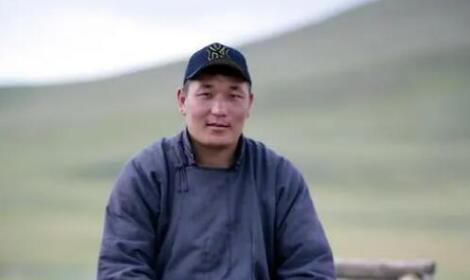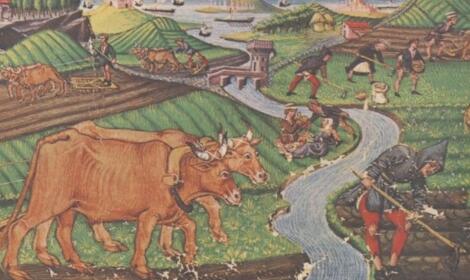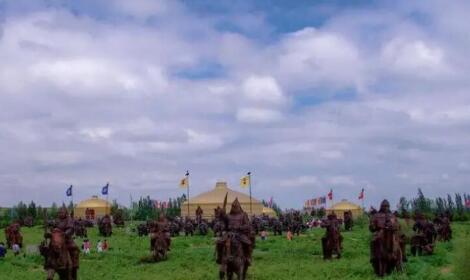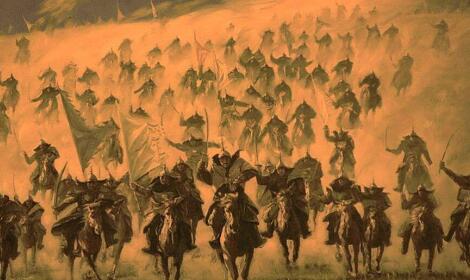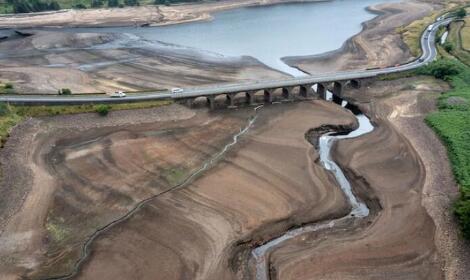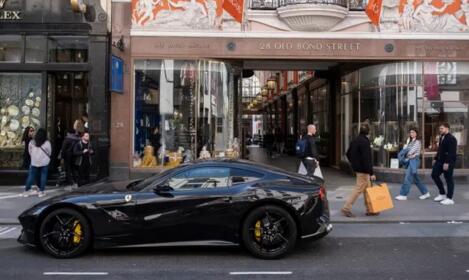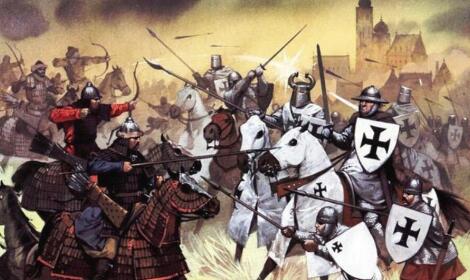“一个人的幸福存在于空旷的草原上” 为什么成吉思汗不利用征服得来的财富和资源来开发蒙古?(三)
正文翻译

Why didn’t Genghis Khan use the wealth and resources from his conquest to develop Mongolia?
为什么成吉思汗不利用征服得来的财富和资源来开发蒙古?

Why didn’t Genghis Khan use the wealth and resources from his conquest to develop Mongolia?
为什么成吉思汗不利用征服得来的财富和资源来开发蒙古?
评论翻译
Susanna Viljanen
Because steppe nations can conquer, subjugate, destroy and reign, but they cannot develop nor build a civilization.
Mongols were just another steppe barbarian nation. They come from nowhere, rage for a while, conquer vast areas, destroy nations, cities and civilizations, and then disappear into the trashcan of history leaving nothing behind but a needlessly bad reputation. Skythians, Alans, Avars, Huns, Heruls, Gepids, Sarmatians, Cimmerians. You name it. Or they settle down, begin to cultivate land, build towns and get civilized, like the Hungarians.
The real exception on Mongols were that they had literacy, ideology and discipline. They were hell-bent on conquest and subjugating the whole world under one sceptre. They were not about getting wealthy, civilized and developed; they were about subjugating, enslaving and dominating others.
Steppe nomads appreciate the vast emptiness of the steppe above everything else. Their society is utterly patriarchal, polygamous and macho, and extremely violent. The wealth of a man is measured by the livestock he has and by his ability to conspicuous consumption. Steppe nomads scorn agriculture and farming and having homesteads and urban lifestyle, They prefer to be on the move.
草原国家可以征服、毁灭和统治,但他们不能发展或建立文明。
蒙古人只是另一个草原蛮族国家。他们不知从哪里冒出来,狂暴一时,征服广大地区,摧毁国家、城市和文明,然后消失在历史的垃圾桶里,只留下不必要的坏名声。
斯基提人,阿兰人,阿瓦尔人,匈奴人,赫鲁尔人,格皮兹人,萨尔马西亚人,西梅利亚人——你能想到的。他们或者定居下来,开始耕种土地,建造城镇,变得文明,就像匈牙利人一样。
蒙古人真正的例外是他们有读写能力、意识形态和纪律。他们一心要征服和整个世界。他们不是为了变得富有、文明和发达,它们是关于征服、奴役和支配他人。
草原游牧民族最欣赏的是广袤的草原。他们的社会完全是男权社会,一夫多妻制,男性至上,极端暴力。一个人的财富是由他拥有的牲畜和他炫耀性消费的能力来衡量的。草原游牧民族鄙视农业和耕种,鄙视宅基地和城市生活方式,他们更喜欢迁徙。
Having just returned from 1200 nautical miles’ bluewater sailing voyage, I can well understand that mindset - the steppe is the same for the nomads as sea is for sailors. The ultimate freedom.
Getting developed means getting civilized, and it also means settling down and getting urbanized. This is something steppe nomads simply won’t do. It means a complete paradigm change and a complete lifestyle change.
To build a civilization, you need to get urbanized. You have to set up the rule of law, the stratified society, stable political system, property rights and individual rights and freedoms. Nothing such can happen in a steppe nomad society.
The Mongols put all the riches they looted from subjugated territories into conspicuous consumption and luxuries. They never developed banking, financing nor any economic institutions. Such institutions would have been foolish at steppe.
But like all steppe nomad empires, also the Mongol Empire was doomed already in the start. Once the conquests end, and the conquered territories have been milked dry from their wealth, the economy will collapse and internal in-fighting begin. The Unified Empire effectively disintegrated already at the death of Möngke, and after Kubilai it was no more.
我刚从1200海里的蓝水航行中回来,很能理解这种心态——草原对于游牧民族来说,就像大海对于水手一样——这是终极的自由。
发达意味着文明,也意味着定居和城市化。这是草原游牧民族不会做的事。这意味着一种完全的范式改变和生活方式的改变。为了建立文明,你需要城市化。你必须建立法治,分层的社会,稳定的政治制度,财产权和个人权利和自由。这样的事情在草原游牧社会是不可能发生的。
蒙古人把他们从被征服的领土上掠夺的所有财富都用于炫耀性消费和奢侈品。他们从未发展过银行、金融或任何经济机构。这样的机构在草原上是愚蠢的。
但就像所有草原游牧帝国一样,蒙古帝国从一开始就注定要灭亡。一旦征服结束,被征服领土的财富被榨干,经济就会崩溃,内部争斗就会开始。在蒙哥可汗死后,统一帝国实际上已经瓦解,在忽必烈死后,统一帝国则不复存在。
Jacob Dorey
And yet the kingdom of Hungary which was the most powerful kingdom in Central Europe for most of the medi period was started by steppe peoplesand the Mongols contributed to much economic prosperity in Asia despite their terror. Do not loop nomads or even steppe peoples as if they are of the same culture together. We are talking about various cultures in history with different conditions over countless years you can’t generalize them and assume they are the same. You can’t do that with Europeans either.
然而,匈牙利王国是中世纪中欧最强大的王国,它是由草原民族建立的,蒙古人尽管恐怖,但对亚洲的经济繁荣做出了很大贡献。不要把游牧民族甚至草原民族当作是同一文化的人。
我们谈论的是历史上不同的文化,在不同时代的不同条件下。你不能一概而论,假设它们是一样的。你对欧洲人也不能这么做。
MC.
It is just sign of uneducated person’s action. Based on one book or 2, be able to write it as if she was there seeing with her eyes.
这只是没受过教育的人行为的标志。
以一两本书为基础,就以为是她亲眼所见一样。
Ari Zadok
You ignore Kublai until the very end. How does the Yuan dynasty and the Mongol rule of China (not to mention the Ilkhanate in SW Asia) fit into your narrative? The Mongols certainly brought destruction to these places, and it’s true their rule was fleeting, but they did seek to rule the civilized places of the world. They didn’t simply retreat back to the steppe with their loot as you describe.
直到最后一刻你(楼主)都在无视忽必烈。元朝和蒙古对中国的统治(更不用说西亚的伊尔汗国)如何符合你的叙述?
蒙古人当然给这些地方带来了破坏,他们的统治确实是短暂的,但他们确实试图统治世界上的文明地区。他们并没有像你描述的那样带着战利品撤退回草原。
Nagy Zoli
A little bit lacking obxtivity here Suzy. They were neither barbarian nor stupid. Conquest happen for a reason. They become a trader nation AFTER the conquest. And they conquered China at one point, then they simply got absorbed by it. The cities the rules were all there. And the crux of all empires is logistics: No internet, not phone, no satellite and GPS meant something happening in the hungarian plains (like a pretty significant defeat) would reach the superiors sitting in Mongolia almost 2 months. This was way to slow, no reaction to events. That is the main reason the empire split up. Remeber, the Golden Horde ruled current Crimea for centuries to come, before finally being conquered by the Russians. The mongols did not vanish. They split up in smaller, manageable entities. In both hungarian and romanian history, the “tatars” from Crimeea played a significant part, way later than 1280 (the second mongol invasion that was stopped by the reformed hungarian army, after the 1241 big defeat)
有点不够客观,楼主。他们既不是野蛮人,也不是蠢货。征服是有原因的。他们在征服后成为了一个贸易国家。他们一度征服了中国,然后就被中国吸引了——城市,法规,那里所有的一切。
所有帝国的关键是物流:没有互联网,没有电话,没有卫星和GPS,这意味着匈牙利平原上发生的事情要传到蒙古的上级需要几乎两个月。这等于是没有作出反应。这就是帝国分裂的主要原因。请记住,金帐汗国在被俄罗斯人征服之前统治了现在的克里米亚几个世纪。蒙古人并没有消失。他们分成更小的、可管理的实体。
在匈牙利和罗马尼亚的历史上,来自克里米亚的“鞑靼人”扮演了重要的角色,远远晚于1280年(1241年大失败后,改革后的匈牙利军队阻止了蒙古的第二次入侵)。
Mehmet Uluğ
Develop what in Mongolia? Why actually allocate funds and resources to an area which is not on a trade route, and is basically unappealing to both merchants and artisans? Chingiss Khan had no reason to actually create a city out of nothing.
The fact that Mongol Khans did not believe in cities and or defenses is mostly a myth. None of his sons and grandsons ever chose the yurt over the palace. All of them lived in large estates in Central Asia, Iran, Russia and China. China, with its remote location became the leading center of the Empire, for a while. Even there, the Borjigid rulers lived in palaces and enjoyed the good life of civilization.
Mongolia proper, as you might fathom, was not a place that most of the Mongols wanted to remain or go back to. This is the reason why Mongolia was never allocated greater resources than say, Samarkand, or Ordu Balyk, or any other, more populous realms within the Mongol Empire.
在蒙古发展什么?为什么要把资金和资源分配到一个不在贸易路线上,基本上对商人和工匠都没有吸引力的地区?成吉思汗没有理由凭空建造一座城市。
蒙古可汗不相信城市或防御的事实基本上是子虚乌有。他的儿子和孙子都没有选择蒙古包而是选择了宫殿。他们都住在中亚、伊朗、俄罗斯和中国的大庄园里。由于地处偏远,中国一度成为帝国的主要中心。即使在那里,孛儿只斤氏王朝的统治者也住在宫殿里,享受着文明的美好生活。
蒙古本身,如你所知,并不是一个大多数蒙古人想留下来或回去的地方。这就是为什么蒙古从未被分配到比撒马尔罕、奥尔都巴尔克或蒙古帝国其他人口更多的地区更多资源的原因。
Christian Desaix
As others have said, “development” in the modern sense meant nothing to the Mongol leadership. Their goal was to control (and tax) trade over the steppe. That’s what steppe empires traditionally did. In one metaphor (Luc Kwanten’s “Imperial Nomads”) the steppe was an ocean, and steppe empires, like, e.g., the Portuguese in the Indian Ocean, functioned by controlling and taxing routes of passage. The Mongols went one step further by seizing the “ports”, the great cities that were the termini for steppe trade. The Mongols didn’t care about building cities or irrigation systems or factories. What they cared about (and were very good at) was organizing trade routes and levying taxes and tribute.
正如其他人所说,现代意义上的“发展”对蒙古领导层来说毫无意义。他们的目标是控制(并征税)草原上的贸易。这是草原帝国的传统做法。在一个比喻中,草原是海洋 (Luc Kwanten的《帝国游牧民族》)。草原帝国,例如印度洋上的葡萄牙帝国,通过控制和征税来发挥作用。蒙古人更进一步,占领了“港口”,即作为草原贸易终点站的大城市。蒙古人不在乎建造城市、灌溉系统或工厂。他们所关心的(并且非常擅长的)是组织贸易路线、征税和进贡。
Che-Kwon Chung
If you were to acquire Google would you would you use all your resources and try to develop a new world class search engine or would keep on growing your portfolio using Google as your base?
Genghis Khan was the modern day investment banker. He would acquire already developed empires, give high and profitable incentives to those who would join him, and keep on his acquisition spree.
It got so successful to the point where his portfolio got so big within a short period, less synergistic, and difficult to manage. And this is where the Mongolian Empire began to crumble and has to resort to spin offs.
Perhaps if he had focus on slower growth, by building fundamentals and synergies with the empires he acquired, the Mongolian Empire would have lasted longer
如果你要收购谷歌,你会使用你所有的资源,尝试开发一个新的世界级搜索引擎,还是会以谷歌为基础继续扩大你的投资组合?
成吉思汗可以看作当代的投资银行家。他会收购已经发展成熟的帝国,给那些愿意加入他的人高额的、有利可图的激励,并继续他的收购狂欢。
它如此成功,以至于他的投资组合在短时间内变得如此庞大,但缺乏协同作用,而且难以管理。这就是蒙古帝国开始崩溃的地方,不得不求助于分支机构。
也许,如果他专注于减缓增长,通过与他收购的帝国建立基本面和协同效应,蒙古帝国将会持续更长时间。
Jeff Gruszynski
He would have had no such concept. “Develop?!” That’s an entirely post-industrial revolution concept.
Genghis Khan lived an “Anarcho-Fascist” life where he took what he wanted until the resources of that area were drained, and then he moved on to find new plunder.
He “refined” that model once the pickings got thinner and he’d conquered more than he personally could rule - then he designated lieutenants to become warlords reporting to him by “dotted line” (in modern corporate parlance) who ran individual cities and geographies more or less autonomously but always in his name and authority.
And that was about as sophisticated and “civilized” as it ever NEEDED to be so it never went beyond that. Nothing to “develop” - that’s a much higher level of organizational complexity than ever existed or ever could have existed under Genghis Khan.
他不会有这样的概念。“发展? !”这完全是一个后工业革命的概念。
成吉思汗过着一种“无政府法西斯”的生活,他想要什么就拿什么,直到该地区的资源枯竭,然后他继续进行新的掠夺。
一旦他的战利品越来越少,他征服的东西超过了他个人所能统治的范围,他就着手“完善”这种模式:指定副手成为军阀,通过“虚线”(现代企业用语)向他汇报,他们或多或少地自主管理各个城市和地区,但总是在他的名义和权威之下。
这就是它所需要的复杂和“文明”,所以它从未超越这一点。没有什么可以“发展”的,这比成吉思汗时代存在过的或可能存在过的组织复杂性要高得多。
Anand Nyamdavaa
“A man’s happiness lies in an empty steppe.” Mongolian proverb
When Chinggis Khan united all the tribes and started conquests, he designated and built a city, Kharakorum. The main purpose was to house artisans and merchants, a place to trade (market). He probably built a palace and used it whenever he was in the capital. But his main place for dwelling was a ger, like in the above picture.
By 1254, when William of Rubruck, a Flemish Franciscan missionary and explorer, traveled to Mongolia, the city was huge. There were separate quarters for Chinese and Muslim artisans and merchants. There were also a number of European traders and artisans. The famous silver fountain was made by a french goldsmith Guillaume Bouchie.The fountain would dispense airag, fermented horse milk, alcohol and other beverages.
“一个人的幸福存在于空旷的草原上。”蒙古谚语
成吉思汗统一了所有的部落并开始征伐,他指定并建造了一座城市,哈拉和林。主要目的是容纳工匠和商人,一个交易(市场)的地方。他可能建了一座宫殿,回到首都的时候用上它。但他主要居住的地方是蒙古包。
当到1254年鲁不鲁乞——佛兰德方济会的传教士和探险家,前往蒙古之时,这座城市是巨大的。中国人和穆斯林工匠和商人有各自的住处。还有一些欧洲商人和工匠。著名的银喷泉就是由法国金匠Guillaume Bouchie制作的。它可以用于发酵制作马奶酒、酒精和其他饮料。

But despite all the splendour, Mongolian khans still preferred Mongolian gers. This is what he wrote about them:
…they make these houses so large that they are sometimes thirty feet in width (9 meters). I myself once measure the width between the wheel-tracks of a cart twenty feet (6 meters), and when the house was on the cart it projected beyond the wheels on either side five feet (1.5m) at least. I have myself counted to one cart twenty-two oxen drawing one house, eleven abreast across the width of the cart, and the other eleven before them. The axle of the cart was as large as the mast of a ship.”
尽管如此,蒙古可汗仍然偏爱蒙古包。他是这样写的:
“他们把这些房子盖得很大,有时宽达30英尺(9米)。我自己曾经测量过一辆马车的车轮之间的宽度为20英尺(6米),当房子放在马车上时,它至少比车轮两侧高出5英尺(1.5米)。我自己数过一辆车,二十二头牛牵着一幢房子,在车的宽度上,十一头并排,另外十一头在它们前面。马车的车轴和船的桅杆一样大。”
So back to the question on why Chinggis Khan didn't use his wealth to develop cities.
If you could travel back to the 13th century, you would see that most of the countries were agrarian. There were clusters of cities, but most of the non-nomadic world was fields of produce and small huts. The cities were dirty, full of decomposing rubbish and human excrement. The minority nobility might have lived a nice life, but for most residents, life was grim.
The cities, even with the largest walls, could be demolished and destroyed. Therefore Chinggis Khan and his successors understood that the strength of the people lies not in the walls, but in mobility. If you have cities, they could be destroyed and the kings killed, but mobile people are much more difficult to conquer. Nothing beats huge sparsely populated territories. Huge territories that provide enough grass to nourish the livestock, and clean waters that would quench the thirst of the steeds. As long as you have livestock, life goes on, no matter what.
那么回到为什么成吉思汗没有用他的财富来发展城市的问题上。如果你能回到13世纪,你会看到大多数国家都是农业国家。
虽然有城市集群,但大部分非游牧世界都是农田和小茅屋。城市很脏,到处都是腐烂的垃圾和人类粪便。少数贵族可能过着美好的生活,但对大多数居民来说,生活是残酷的。
城市,即使有最大的城墙,也可能被拆除和摧毁。因此,成吉思汗和他的继任者明白,民众的力量不在于城墙,而在于流动性。如果你有城市,它们可能会被摧毁,国王也可能会被杀死,但流动的人很难被征服。没有什么比幅员辽阔、人烟稀少的领土更好的了。广阔的土地上有足够的草来喂养牲畜,还有干净的水来解渴。只要你有牲畜,生活就会继续,无论发生什么。
So why build cities that can be destroyed?
Why have farms and be chained to land? It is much better to travel with livestock and live off the land.
I have recently traveled to this lake. It is called the blue lake of black heart. This small lake has a big significance in Mongol History. It was where all the khans met and made Temuujin the king of all kings. So anyway I was sitting at the banks and thinking that not much has changed since those times. Except for some small dwellings, tourist camps, I could imagine the place as if in the 13th century. I could think where the big Khan’s gers would be established. The smaller gers would be over there. The vast majority of livestock would have to be behind the mountain. This is where I would have soldiers etc.
It occurred to me that perhaps the biggest legacy for us was not big cities, big factories, but an untouched land. When looking at it you realise the truth about the above proverb: A man’s happiness lies in an empty steppe.
所以,为什么要建造可以被摧毁的城市呢?为什么要有农场,还要被拴在土地上?带着牲畜旅行,靠土地生活要好得多。
我最近去了这个湖。它被称为黑色心灵的蓝色湖泊。这个小湖在蒙古历史上有着重要的意义。这里是所有可汗聚集的地方,他们拥立铁木真为万王之王。不管怎样,我坐在银行里想,从那时起,一切都没有什么变化。除了一些小住宅,旅游营地,我可以想象这个地方好像在13世纪一样。我能想到大汗的蒙古包会建在哪里,小一点的蒙古包会在哪里。绝大多数牲畜必须躲在山的后面。我在这里部署士兵等等。
我突然想到,也许对我们来说,最大的遗产不是大城市,不是大工厂,而是一片未被开发的土地。当你看到它的时候,你会意识到上面这句谚语的真相:一个人的幸福存在于空旷的草原上。

Charlie Knoles
I visited your beautiful country in July. The open steppe is one of the most beautiful things I have seen. Mongolians are among the coolest and most fun people I’ve had the joy to encounter. Can’t wait to go back.
我在7月份访问了你们美丽的国家。开阔的草原是我见过的最美丽的东西之一。蒙古人是我有幸遇到的最酷、最有趣的人之一。等不及要回去了。
Reinhard L
I can understand that. That lake in the steppe beats a crowded city by a tenfold. Which I was there.
我能理解。草原上的那个湖比拥挤的城市强十倍。我当时在场。
Anuradha Priyankara
I think Mongolians still have a great love toward gers. I have seen they are even used as temporary living quarters in construction sites. It's a rare sight to see people using their traditional housing methods for that kind of purposes.
我觉得蒙古人对蒙古包还是很热爱的。我见过它们甚至被用作建筑工地的临时住所。很少能看到人们用传统的住房方式来达到这种目的。
Paul Roese
the economic development of countries requires certain preconditions in order to occur. things like the rule of law, a stable political state, concepts of property rights, the value of education. a society like that of the Mongols had none of those elements so could hardly be expected to become an economic powerhouse. Genghis Khan never waged a "Hearts and Minds" campaign but one totally based on ultra violence. he wasn't like the Buddha trying to convince folks by thoughtful appeals. he united the Mongols by violence and it continued to be his main tool in the building of the empire. the Mongols primary basis of acquiring wealth was based on stealing it. one advantage of a pre literate society like the Mongols had is there were no records to show who owned what. one reads about a khan like Möngke who allegedly instituted reforms throughout the empire but where would he get a clue about fiscal and monetary policies??? how would he know about banking regulation and import/export trade practices??? the writeups make it read like the dude was a graduate of the London School of Economics. seriously? it should not be forgotten that the "unity" of the Mongols imploded mere decades after GK’s death as internecine warfare among his family and Mongol tribes broke out again. political instability is a detriment to any long range economic development.
国家的经济发展需要一定的前提条件。比如法治,稳定的政治状态,财产权的概念,教育的价值。像蒙古那样的社会没有这些因素,因此很难指望它成为一个经济强国。
成吉思汗从来没有发动过“心连心”运动,而是完全基于极端暴力的运动。他不像佛陀那样试图通过深思熟虑的呼吁来说服人们。他用暴力统一了蒙古人,这一直是他建立帝国的主要工具。蒙古人获得财富的主要基础是偷窃。
像蒙古这样的前文字社会的一个优势是没有记录显示谁拥有什么。有人读到过可汗蒙哥,据说他在整个帝国推行改革,但他如何能得到财政和货币政策的线索?他又如何会知道银行监管和进出口贸易惯例? 这篇文章写得好像这家伙毕业于伦敦政治经济学院。认真的?
不应该忘记,蒙古的“统一”在成吉思汗死后仅仅几十年,他的家族和蒙古部落之间的内讧就再次爆发。政治不稳定对任何长远的经济发展都是不利的。
Because steppe nations can conquer, subjugate, destroy and reign, but they cannot develop nor build a civilization.
Mongols were just another steppe barbarian nation. They come from nowhere, rage for a while, conquer vast areas, destroy nations, cities and civilizations, and then disappear into the trashcan of history leaving nothing behind but a needlessly bad reputation. Skythians, Alans, Avars, Huns, Heruls, Gepids, Sarmatians, Cimmerians. You name it. Or they settle down, begin to cultivate land, build towns and get civilized, like the Hungarians.
The real exception on Mongols were that they had literacy, ideology and discipline. They were hell-bent on conquest and subjugating the whole world under one sceptre. They were not about getting wealthy, civilized and developed; they were about subjugating, enslaving and dominating others.
Steppe nomads appreciate the vast emptiness of the steppe above everything else. Their society is utterly patriarchal, polygamous and macho, and extremely violent. The wealth of a man is measured by the livestock he has and by his ability to conspicuous consumption. Steppe nomads scorn agriculture and farming and having homesteads and urban lifestyle, They prefer to be on the move.
草原国家可以征服、毁灭和统治,但他们不能发展或建立文明。
蒙古人只是另一个草原蛮族国家。他们不知从哪里冒出来,狂暴一时,征服广大地区,摧毁国家、城市和文明,然后消失在历史的垃圾桶里,只留下不必要的坏名声。
斯基提人,阿兰人,阿瓦尔人,匈奴人,赫鲁尔人,格皮兹人,萨尔马西亚人,西梅利亚人——你能想到的。他们或者定居下来,开始耕种土地,建造城镇,变得文明,就像匈牙利人一样。
蒙古人真正的例外是他们有读写能力、意识形态和纪律。他们一心要征服和整个世界。他们不是为了变得富有、文明和发达,它们是关于征服、奴役和支配他人。
草原游牧民族最欣赏的是广袤的草原。他们的社会完全是男权社会,一夫多妻制,男性至上,极端暴力。一个人的财富是由他拥有的牲畜和他炫耀性消费的能力来衡量的。草原游牧民族鄙视农业和耕种,鄙视宅基地和城市生活方式,他们更喜欢迁徙。
Having just returned from 1200 nautical miles’ bluewater sailing voyage, I can well understand that mindset - the steppe is the same for the nomads as sea is for sailors. The ultimate freedom.
Getting developed means getting civilized, and it also means settling down and getting urbanized. This is something steppe nomads simply won’t do. It means a complete paradigm change and a complete lifestyle change.
To build a civilization, you need to get urbanized. You have to set up the rule of law, the stratified society, stable political system, property rights and individual rights and freedoms. Nothing such can happen in a steppe nomad society.
The Mongols put all the riches they looted from subjugated territories into conspicuous consumption and luxuries. They never developed banking, financing nor any economic institutions. Such institutions would have been foolish at steppe.
But like all steppe nomad empires, also the Mongol Empire was doomed already in the start. Once the conquests end, and the conquered territories have been milked dry from their wealth, the economy will collapse and internal in-fighting begin. The Unified Empire effectively disintegrated already at the death of Möngke, and after Kubilai it was no more.
我刚从1200海里的蓝水航行中回来,很能理解这种心态——草原对于游牧民族来说,就像大海对于水手一样——这是终极的自由。
发达意味着文明,也意味着定居和城市化。这是草原游牧民族不会做的事。这意味着一种完全的范式改变和生活方式的改变。为了建立文明,你需要城市化。你必须建立法治,分层的社会,稳定的政治制度,财产权和个人权利和自由。这样的事情在草原游牧社会是不可能发生的。
蒙古人把他们从被征服的领土上掠夺的所有财富都用于炫耀性消费和奢侈品。他们从未发展过银行、金融或任何经济机构。这样的机构在草原上是愚蠢的。
但就像所有草原游牧帝国一样,蒙古帝国从一开始就注定要灭亡。一旦征服结束,被征服领土的财富被榨干,经济就会崩溃,内部争斗就会开始。在蒙哥可汗死后,统一帝国实际上已经瓦解,在忽必烈死后,统一帝国则不复存在。
Jacob Dorey
And yet the kingdom of Hungary which was the most powerful kingdom in Central Europe for most of the medi period was started by steppe peoplesand the Mongols contributed to much economic prosperity in Asia despite their terror. Do not loop nomads or even steppe peoples as if they are of the same culture together. We are talking about various cultures in history with different conditions over countless years you can’t generalize them and assume they are the same. You can’t do that with Europeans either.
然而,匈牙利王国是中世纪中欧最强大的王国,它是由草原民族建立的,蒙古人尽管恐怖,但对亚洲的经济繁荣做出了很大贡献。不要把游牧民族甚至草原民族当作是同一文化的人。
我们谈论的是历史上不同的文化,在不同时代的不同条件下。你不能一概而论,假设它们是一样的。你对欧洲人也不能这么做。
MC.
It is just sign of uneducated person’s action. Based on one book or 2, be able to write it as if she was there seeing with her eyes.
这只是没受过教育的人行为的标志。
以一两本书为基础,就以为是她亲眼所见一样。
Ari Zadok
You ignore Kublai until the very end. How does the Yuan dynasty and the Mongol rule of China (not to mention the Ilkhanate in SW Asia) fit into your narrative? The Mongols certainly brought destruction to these places, and it’s true their rule was fleeting, but they did seek to rule the civilized places of the world. They didn’t simply retreat back to the steppe with their loot as you describe.
直到最后一刻你(楼主)都在无视忽必烈。元朝和蒙古对中国的统治(更不用说西亚的伊尔汗国)如何符合你的叙述?
蒙古人当然给这些地方带来了破坏,他们的统治确实是短暂的,但他们确实试图统治世界上的文明地区。他们并没有像你描述的那样带着战利品撤退回草原。
Nagy Zoli
A little bit lacking obxtivity here Suzy. They were neither barbarian nor stupid. Conquest happen for a reason. They become a trader nation AFTER the conquest. And they conquered China at one point, then they simply got absorbed by it. The cities the rules were all there. And the crux of all empires is logistics: No internet, not phone, no satellite and GPS meant something happening in the hungarian plains (like a pretty significant defeat) would reach the superiors sitting in Mongolia almost 2 months. This was way to slow, no reaction to events. That is the main reason the empire split up. Remeber, the Golden Horde ruled current Crimea for centuries to come, before finally being conquered by the Russians. The mongols did not vanish. They split up in smaller, manageable entities. In both hungarian and romanian history, the “tatars” from Crimeea played a significant part, way later than 1280 (the second mongol invasion that was stopped by the reformed hungarian army, after the 1241 big defeat)
有点不够客观,楼主。他们既不是野蛮人,也不是蠢货。征服是有原因的。他们在征服后成为了一个贸易国家。他们一度征服了中国,然后就被中国吸引了——城市,法规,那里所有的一切。
所有帝国的关键是物流:没有互联网,没有电话,没有卫星和GPS,这意味着匈牙利平原上发生的事情要传到蒙古的上级需要几乎两个月。这等于是没有作出反应。这就是帝国分裂的主要原因。请记住,金帐汗国在被俄罗斯人征服之前统治了现在的克里米亚几个世纪。蒙古人并没有消失。他们分成更小的、可管理的实体。
在匈牙利和罗马尼亚的历史上,来自克里米亚的“鞑靼人”扮演了重要的角色,远远晚于1280年(1241年大失败后,改革后的匈牙利军队阻止了蒙古的第二次入侵)。
Mehmet Uluğ
Develop what in Mongolia? Why actually allocate funds and resources to an area which is not on a trade route, and is basically unappealing to both merchants and artisans? Chingiss Khan had no reason to actually create a city out of nothing.
The fact that Mongol Khans did not believe in cities and or defenses is mostly a myth. None of his sons and grandsons ever chose the yurt over the palace. All of them lived in large estates in Central Asia, Iran, Russia and China. China, with its remote location became the leading center of the Empire, for a while. Even there, the Borjigid rulers lived in palaces and enjoyed the good life of civilization.
Mongolia proper, as you might fathom, was not a place that most of the Mongols wanted to remain or go back to. This is the reason why Mongolia was never allocated greater resources than say, Samarkand, or Ordu Balyk, or any other, more populous realms within the Mongol Empire.
在蒙古发展什么?为什么要把资金和资源分配到一个不在贸易路线上,基本上对商人和工匠都没有吸引力的地区?成吉思汗没有理由凭空建造一座城市。
蒙古可汗不相信城市或防御的事实基本上是子虚乌有。他的儿子和孙子都没有选择蒙古包而是选择了宫殿。他们都住在中亚、伊朗、俄罗斯和中国的大庄园里。由于地处偏远,中国一度成为帝国的主要中心。即使在那里,孛儿只斤氏王朝的统治者也住在宫殿里,享受着文明的美好生活。
蒙古本身,如你所知,并不是一个大多数蒙古人想留下来或回去的地方。这就是为什么蒙古从未被分配到比撒马尔罕、奥尔都巴尔克或蒙古帝国其他人口更多的地区更多资源的原因。
Christian Desaix
As others have said, “development” in the modern sense meant nothing to the Mongol leadership. Their goal was to control (and tax) trade over the steppe. That’s what steppe empires traditionally did. In one metaphor (Luc Kwanten’s “Imperial Nomads”) the steppe was an ocean, and steppe empires, like, e.g., the Portuguese in the Indian Ocean, functioned by controlling and taxing routes of passage. The Mongols went one step further by seizing the “ports”, the great cities that were the termini for steppe trade. The Mongols didn’t care about building cities or irrigation systems or factories. What they cared about (and were very good at) was organizing trade routes and levying taxes and tribute.
正如其他人所说,现代意义上的“发展”对蒙古领导层来说毫无意义。他们的目标是控制(并征税)草原上的贸易。这是草原帝国的传统做法。在一个比喻中,草原是海洋 (Luc Kwanten的《帝国游牧民族》)。草原帝国,例如印度洋上的葡萄牙帝国,通过控制和征税来发挥作用。蒙古人更进一步,占领了“港口”,即作为草原贸易终点站的大城市。蒙古人不在乎建造城市、灌溉系统或工厂。他们所关心的(并且非常擅长的)是组织贸易路线、征税和进贡。
Che-Kwon Chung
If you were to acquire Google would you would you use all your resources and try to develop a new world class search engine or would keep on growing your portfolio using Google as your base?
Genghis Khan was the modern day investment banker. He would acquire already developed empires, give high and profitable incentives to those who would join him, and keep on his acquisition spree.
It got so successful to the point where his portfolio got so big within a short period, less synergistic, and difficult to manage. And this is where the Mongolian Empire began to crumble and has to resort to spin offs.
Perhaps if he had focus on slower growth, by building fundamentals and synergies with the empires he acquired, the Mongolian Empire would have lasted longer
如果你要收购谷歌,你会使用你所有的资源,尝试开发一个新的世界级搜索引擎,还是会以谷歌为基础继续扩大你的投资组合?
成吉思汗可以看作当代的投资银行家。他会收购已经发展成熟的帝国,给那些愿意加入他的人高额的、有利可图的激励,并继续他的收购狂欢。
它如此成功,以至于他的投资组合在短时间内变得如此庞大,但缺乏协同作用,而且难以管理。这就是蒙古帝国开始崩溃的地方,不得不求助于分支机构。
也许,如果他专注于减缓增长,通过与他收购的帝国建立基本面和协同效应,蒙古帝国将会持续更长时间。
Jeff Gruszynski
He would have had no such concept. “Develop?!” That’s an entirely post-industrial revolution concept.
Genghis Khan lived an “Anarcho-Fascist” life where he took what he wanted until the resources of that area were drained, and then he moved on to find new plunder.
He “refined” that model once the pickings got thinner and he’d conquered more than he personally could rule - then he designated lieutenants to become warlords reporting to him by “dotted line” (in modern corporate parlance) who ran individual cities and geographies more or less autonomously but always in his name and authority.
And that was about as sophisticated and “civilized” as it ever NEEDED to be so it never went beyond that. Nothing to “develop” - that’s a much higher level of organizational complexity than ever existed or ever could have existed under Genghis Khan.
他不会有这样的概念。“发展? !”这完全是一个后工业革命的概念。
成吉思汗过着一种“无政府法西斯”的生活,他想要什么就拿什么,直到该地区的资源枯竭,然后他继续进行新的掠夺。
一旦他的战利品越来越少,他征服的东西超过了他个人所能统治的范围,他就着手“完善”这种模式:指定副手成为军阀,通过“虚线”(现代企业用语)向他汇报,他们或多或少地自主管理各个城市和地区,但总是在他的名义和权威之下。
这就是它所需要的复杂和“文明”,所以它从未超越这一点。没有什么可以“发展”的,这比成吉思汗时代存在过的或可能存在过的组织复杂性要高得多。
Anand Nyamdavaa
“A man’s happiness lies in an empty steppe.” Mongolian proverb
When Chinggis Khan united all the tribes and started conquests, he designated and built a city, Kharakorum. The main purpose was to house artisans and merchants, a place to trade (market). He probably built a palace and used it whenever he was in the capital. But his main place for dwelling was a ger, like in the above picture.
By 1254, when William of Rubruck, a Flemish Franciscan missionary and explorer, traveled to Mongolia, the city was huge. There were separate quarters for Chinese and Muslim artisans and merchants. There were also a number of European traders and artisans. The famous silver fountain was made by a french goldsmith Guillaume Bouchie.The fountain would dispense airag, fermented horse milk, alcohol and other beverages.
“一个人的幸福存在于空旷的草原上。”蒙古谚语
成吉思汗统一了所有的部落并开始征伐,他指定并建造了一座城市,哈拉和林。主要目的是容纳工匠和商人,一个交易(市场)的地方。他可能建了一座宫殿,回到首都的时候用上它。但他主要居住的地方是蒙古包。
当到1254年鲁不鲁乞——佛兰德方济会的传教士和探险家,前往蒙古之时,这座城市是巨大的。中国人和穆斯林工匠和商人有各自的住处。还有一些欧洲商人和工匠。著名的银喷泉就是由法国金匠Guillaume Bouchie制作的。它可以用于发酵制作马奶酒、酒精和其他饮料。

But despite all the splendour, Mongolian khans still preferred Mongolian gers. This is what he wrote about them:
…they make these houses so large that they are sometimes thirty feet in width (9 meters). I myself once measure the width between the wheel-tracks of a cart twenty feet (6 meters), and when the house was on the cart it projected beyond the wheels on either side five feet (1.5m) at least. I have myself counted to one cart twenty-two oxen drawing one house, eleven abreast across the width of the cart, and the other eleven before them. The axle of the cart was as large as the mast of a ship.”
尽管如此,蒙古可汗仍然偏爱蒙古包。他是这样写的:
“他们把这些房子盖得很大,有时宽达30英尺(9米)。我自己曾经测量过一辆马车的车轮之间的宽度为20英尺(6米),当房子放在马车上时,它至少比车轮两侧高出5英尺(1.5米)。我自己数过一辆车,二十二头牛牵着一幢房子,在车的宽度上,十一头并排,另外十一头在它们前面。马车的车轴和船的桅杆一样大。”
So back to the question on why Chinggis Khan didn't use his wealth to develop cities.
If you could travel back to the 13th century, you would see that most of the countries were agrarian. There were clusters of cities, but most of the non-nomadic world was fields of produce and small huts. The cities were dirty, full of decomposing rubbish and human excrement. The minority nobility might have lived a nice life, but for most residents, life was grim.
The cities, even with the largest walls, could be demolished and destroyed. Therefore Chinggis Khan and his successors understood that the strength of the people lies not in the walls, but in mobility. If you have cities, they could be destroyed and the kings killed, but mobile people are much more difficult to conquer. Nothing beats huge sparsely populated territories. Huge territories that provide enough grass to nourish the livestock, and clean waters that would quench the thirst of the steeds. As long as you have livestock, life goes on, no matter what.
那么回到为什么成吉思汗没有用他的财富来发展城市的问题上。如果你能回到13世纪,你会看到大多数国家都是农业国家。
虽然有城市集群,但大部分非游牧世界都是农田和小茅屋。城市很脏,到处都是腐烂的垃圾和人类粪便。少数贵族可能过着美好的生活,但对大多数居民来说,生活是残酷的。
城市,即使有最大的城墙,也可能被拆除和摧毁。因此,成吉思汗和他的继任者明白,民众的力量不在于城墙,而在于流动性。如果你有城市,它们可能会被摧毁,国王也可能会被杀死,但流动的人很难被征服。没有什么比幅员辽阔、人烟稀少的领土更好的了。广阔的土地上有足够的草来喂养牲畜,还有干净的水来解渴。只要你有牲畜,生活就会继续,无论发生什么。
So why build cities that can be destroyed?
Why have farms and be chained to land? It is much better to travel with livestock and live off the land.
I have recently traveled to this lake. It is called the blue lake of black heart. This small lake has a big significance in Mongol History. It was where all the khans met and made Temuujin the king of all kings. So anyway I was sitting at the banks and thinking that not much has changed since those times. Except for some small dwellings, tourist camps, I could imagine the place as if in the 13th century. I could think where the big Khan’s gers would be established. The smaller gers would be over there. The vast majority of livestock would have to be behind the mountain. This is where I would have soldiers etc.
It occurred to me that perhaps the biggest legacy for us was not big cities, big factories, but an untouched land. When looking at it you realise the truth about the above proverb: A man’s happiness lies in an empty steppe.
所以,为什么要建造可以被摧毁的城市呢?为什么要有农场,还要被拴在土地上?带着牲畜旅行,靠土地生活要好得多。
我最近去了这个湖。它被称为黑色心灵的蓝色湖泊。这个小湖在蒙古历史上有着重要的意义。这里是所有可汗聚集的地方,他们拥立铁木真为万王之王。不管怎样,我坐在银行里想,从那时起,一切都没有什么变化。除了一些小住宅,旅游营地,我可以想象这个地方好像在13世纪一样。我能想到大汗的蒙古包会建在哪里,小一点的蒙古包会在哪里。绝大多数牲畜必须躲在山的后面。我在这里部署士兵等等。
我突然想到,也许对我们来说,最大的遗产不是大城市,不是大工厂,而是一片未被开发的土地。当你看到它的时候,你会意识到上面这句谚语的真相:一个人的幸福存在于空旷的草原上。

Charlie Knoles
I visited your beautiful country in July. The open steppe is one of the most beautiful things I have seen. Mongolians are among the coolest and most fun people I’ve had the joy to encounter. Can’t wait to go back.
我在7月份访问了你们美丽的国家。开阔的草原是我见过的最美丽的东西之一。蒙古人是我有幸遇到的最酷、最有趣的人之一。等不及要回去了。
Reinhard L
I can understand that. That lake in the steppe beats a crowded city by a tenfold. Which I was there.
我能理解。草原上的那个湖比拥挤的城市强十倍。我当时在场。
Anuradha Priyankara
I think Mongolians still have a great love toward gers. I have seen they are even used as temporary living quarters in construction sites. It's a rare sight to see people using their traditional housing methods for that kind of purposes.
我觉得蒙古人对蒙古包还是很热爱的。我见过它们甚至被用作建筑工地的临时住所。很少能看到人们用传统的住房方式来达到这种目的。
Paul Roese
the economic development of countries requires certain preconditions in order to occur. things like the rule of law, a stable political state, concepts of property rights, the value of education. a society like that of the Mongols had none of those elements so could hardly be expected to become an economic powerhouse. Genghis Khan never waged a "Hearts and Minds" campaign but one totally based on ultra violence. he wasn't like the Buddha trying to convince folks by thoughtful appeals. he united the Mongols by violence and it continued to be his main tool in the building of the empire. the Mongols primary basis of acquiring wealth was based on stealing it. one advantage of a pre literate society like the Mongols had is there were no records to show who owned what. one reads about a khan like Möngke who allegedly instituted reforms throughout the empire but where would he get a clue about fiscal and monetary policies??? how would he know about banking regulation and import/export trade practices??? the writeups make it read like the dude was a graduate of the London School of Economics. seriously? it should not be forgotten that the "unity" of the Mongols imploded mere decades after GK’s death as internecine warfare among his family and Mongol tribes broke out again. political instability is a detriment to any long range economic development.
国家的经济发展需要一定的前提条件。比如法治,稳定的政治状态,财产权的概念,教育的价值。像蒙古那样的社会没有这些因素,因此很难指望它成为一个经济强国。
成吉思汗从来没有发动过“心连心”运动,而是完全基于极端暴力的运动。他不像佛陀那样试图通过深思熟虑的呼吁来说服人们。他用暴力统一了蒙古人,这一直是他建立帝国的主要工具。蒙古人获得财富的主要基础是偷窃。
像蒙古这样的前文字社会的一个优势是没有记录显示谁拥有什么。有人读到过可汗蒙哥,据说他在整个帝国推行改革,但他如何能得到财政和货币政策的线索?他又如何会知道银行监管和进出口贸易惯例? 这篇文章写得好像这家伙毕业于伦敦政治经济学院。认真的?
不应该忘记,蒙古的“统一”在成吉思汗死后仅仅几十年,他的家族和蒙古部落之间的内讧就再次爆发。政治不稳定对任何长远的经济发展都是不利的。


